|
|
|
Sort Order |
|
|
|
Items / Page
|
|
|
|
|
|
|
| Srl | Item |
| 1 |
ID:
188390
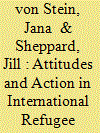

|
|
|
|
|
| Summary/Abstract |
Do citizens care whether their government breaches international law, or are other imperatives more influential? We consider this question in the human rights arena, asking whether and how it matters how abuses are framed. In a novel survey experiment, we ask Australians about their attitudes toward restrictive immigration policy, holding the underlying breaches constant but varying how they are framed. We find that people most strongly oppose policy that violates international law. Emphasizing moral considerations has smaller but still notable impacts on attitudes, whereas reputational frames have the weakest effects. We also find that translating attitudes into political action is challenging: most who learn of current policy's legal, moral, or reputational dimensions and in turn become more critical do not subsequently express greater interest in trying to do something about it. Nonetheless, there are interesting differences across frames. Appealing to international law or moral considerations is more effective at spurring mobilization than emphasizing reputational harm, though via different mechanisms. Framing this debate in international reputational terms consistently has the weakest impacts on interest in political action, and may be worse than saying nothing at all.
|
|
|
|
|
|
|
|
|
|
|
|
|
|
|
|
| 2 |
ID:
188388
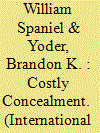

|
|
|
|
|
| Summary/Abstract |
This article presents a formal model that shows how states can credibly reassure each other simply by maintaining a cooperative outward narrative. The reassurance literature to date has focused largely on costly signaling, whereby benign states must distinguish themselves by taking specific actions that hostile types would not. The mere lack of overtly expressed hostility without costly signals has been considered “cheap talk,” on the assumption that this behavior is costless for hostile states and thus uninformative. In contrast, this paper argues that maintaining a cooperative façade while secretly formulating and executing exploitative policies carries inherent trade-offs, and thus constitutes a credible reassurance signal. Foreign policy planning and implementation requires communication among various individuals, groups, and organizations, which has some probability of being observed and punished by outside actors. Yet efforts to conceal the policymaking process and reduce this probability are costly—they require investments in internal monitoring and restrictions on internal communication that can substantially degrade policy outcomes. Thus, to the extent that a state's foreign policymaking process is transparent—that is, that concealing internal communications is difficult—the absence of positive signals of hostility is a credible signal of its benign intentions. The argument is illustrated with a case study of German reassurance signals during the July Crisis preceding World War I.
|
|
|
|
|
|
|
|
|
|
|
|
|
|
|
|
| 3 |
ID:
188386
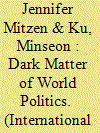

|
|
|
|
|
| Summary/Abstract |
International relations theory has had a trust revival, with scholars focusing on how trust can enhance interpersonal cooperation attempts between leaders. We propose there is another type of trust at play in world politics. International system trust is a feeling of confidence in the international social order, which is indexed especially by trust in its central unit, state persons. System trust anchors ontological security, and its presence is an unstated assumption of the international relations trust scholarship. In this paper we conceptualize system trust. We illuminate its presence by flagging the production of state personhood in a familiar case in international relations trust scholarship, the 1985 Geneva Summit between Reagan and Gorbachev. Interpersonal and system trust perspectives highlight different aspects of the same summit. The juxtaposition suggests new lines of research into the production of state persons in diplomacy, the relationship between interpersonal and system trust, and the impact of the rise of personalistic/patrimonial leadership on diplomacy and international order.
|
|
|
|
|
|
|
|
|
|
|
|
|
|
|
|
| 4 |
ID:
188385


|
|
|
|
|
| Summary/Abstract |
How does collective memory shape politics in the domestic and international spheres? I argue that collective memory—an intersubjective understanding of the past—has no inherent meaning and its salience is entirely contextual. What it means politically depends on the historical trajectory through which it came to form and the political exigency for which it is mobilized in the present. I propose three strategies by which social actors mobilize collective memory: framing—negotiating how the past can be interpreted; accrediting—redefining which narrators are authorized to speak; and binding—enforcing the narrative bounds to which narrators must conform. Using this framework, I reassess the failure of South Korea–Japan reconciliation and find that it has as much to do with the mobilization of collective colonial memory in South Korea over the course of its democratization as with Japanese impenitence. Anti-Japanese memory reflects continued domestic political contestation about how South Korea remembers and identifies itself.
|
|
|
|
|
|
|
|
|
|
|
|
|
|
|
|
| 5 |
ID:
188389


|
|
|
|
|
| Summary/Abstract |
This article examines the emergence of early international organizations and efforts to export European institutional models to the periphery as part of the global expansion of a European international order. In particular, it focuses on the 1884–85 Berlin Conference as a pivotal moment in that expansion and the failed attempt to transplant the Treaty of Vienna model for transboundary river governance to the Congo River. Scholarship on the spread of institutions has highlighted the dangers of applying institutional models from one context to another, but there has been limited attention on why European institutional models are so compelling in the first place. Based on primary historical material, I show that despite some awareness among the diplomats at Berlin that the African context differed from the European one, this knowledge did not disrupt their underlying confidence in the Vienna model. I contend that the reason this model was so compelling was that it was built on two interrelated geographical imaginaries that constituted the diplomats’ understanding of the global and the political possibilities available to them. The first imaginary constituted the periphery as conceptually empty and ready to be remade by European models; the second constituted Europe as the generative site of universal models. Together, these taken-for-granted imaginaries made the diplomats’ practices of adopting the Vienna model seem natural and self-evident. These imaginaries continue to have implications for international politics today as we consider one-size-fits-all technocratic solutions and benchmarks for global progress.
|
|
|
|
|
|
|
|
|
|
|
|
|
|
|
|
| 6 |
ID:
188391
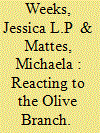

|
|
|
|
|
| Summary/Abstract |
A popular view holds that foreign policy hawks have an advantage at bringing about rapprochement with international adversaries. This idea is rooted in domestic politics: voters respond more favorably to efforts at reconciliation when their own leader has a hawkish rather than a dovish reputation. Yet, domestic reactions are only part of the equation—to succeed, rapprochement must also evoke a favorable response by the adversary. In this research note, we argue that hawks who make conciliatory gestures may face international liabilities that could offset their domestic advantages. Foreign audiences should view doves who make overtures as more sincere and should therefore be more willing to support cooperation with foreign doves than with foreign hawks. We field a pair of survey experiments to examine whether Americans respond differently when foreign hawks versus foreign doves deliver the olive branch. We find that foreign doves fare better at eliciting cooperation because they are deemed more sincere, though the prospect of military vulnerability limits how willing Americans are to respond positively even to a dove who makes a gesture. Thus, while past research has shown that hawks are better positioned domestically to initiate rapprochement, our findings suggest that they have a harder time eliciting a favorable response from the adversary.
|
|
|
|
|
|
|
|
|
|
|
|
|
|
|
|
| 7 |
ID:
188387
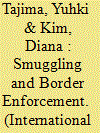

|
|
|
|
|
| Summary/Abstract |
This article analyzes the efficacy of border enforcement against smuggling. We argue that walls, fences, patrols, and other efforts to secure porous borders can reduce smuggling, but only in the absence of collusion between smugglers and state agents at official border crossings. When such corruption occurs, border enforcement merely diverts smuggling flows without reducing their overall volume. We also identify the conditions under which corruption occurs and characterize border enforcement as a sorting mechanism that allows high-skilled smugglers to forge alternative border-crossing routes while deterring low-skilled smugglers or driving them to bribe local border agents. Combining a formal model and an archival case study of opium smuggling in Southeast Asia, we demonstrate that border enforcement has conditional effects on the routes and volumes of smuggling, depending on the nature of interactions between smugglers and border agents. By drawing attention to the technological and organizational aspects of smuggling, this article brings scholarship on criminal governance into the study of international relations, and contributes to debates on the effects of border enforcement and border politics more generally.
|
|
|
|
|
|
|
|
|
|
|
|
|
|
|
|
|
|
|
|
|